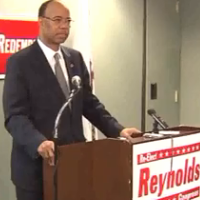 In addition to the much more contemporary mass slaughter of ethnic Chechens by the Russian Federation (and earlier waves of deadly internal deportations by the Soviet Union), there’s the simple, horrifying reality that the Sochi Olympics are being held pretty much at ground zero of a 19th century genocide/mass expulsion.
In addition to the much more contemporary mass slaughter of ethnic Chechens by the Russian Federation (and earlier waves of deadly internal deportations by the Soviet Union), there’s the simple, horrifying reality that the Sochi Olympics are being held pretty much at ground zero of a 19th century genocide/mass expulsion.
Read more
Author Archives: Bill Humphrey
Interview: Background on Venezuela situation
In March 2013, a little less than a year ago, I interviewed the University of Delaware’s Dr. Julio Carrion, an expert on mass support for authoritarian alternatives to democracy in Latin America, about the legacy of President Hugo Chavez, who had just passed away at the time. Since then, his party and successor has struggled to keep Venezuela’s population happy — leading to protests in the last several days.
This 18 minute interview provides a ton of great background information on the problems facing Venezuelans today.
Interview on Hugo Chavez – Dr. Julio Carrion
Podcast: Play in new window | Download
Subscribe: RSS
VW: When management is the vanguard of the proletariat
 Been a busy month for me so I haven’t had a chance to give the story due diligence, but if you didn’t hear: the German automaker Volkswagen’s U.S. division attempted to unionize their own workers in Tennessee.
Been a busy month for me so I haven’t had a chance to give the story due diligence, but if you didn’t hear: the German automaker Volkswagen’s U.S. division attempted to unionize their own workers in Tennessee.
This is unusual for a number of reasons, as I’ll get to in a moment, but it’s particularly significant coming in Tennessee, a state that has become home to a lot of foreign car manufacturers’ American branches and is a so-called “Right to Work” state. “Right to Work” laws are designed discourage unionization by changing how worker votes occur and allowing management to intimidate or pressure workers into voting against forming a union, i.e. giving workers the “right” to work outside of union (because every American must have the right to be their own David against the corporate Goliath in contract negotiations… I guess?).
So anyway, if VW employees unionize, it will automatically put pressure on Tennessee’s other foreign-based carmakers to raise wages somewhat to remain competitive and retain their workers, even if they remain non-unionized (past studies have demonstrated this effect pretty clearly), and it will probably encourage unionization drives elsewhere.
Read more
Europe and the American death penalty
 Typically, the only countries that try to tell the United States what to do are in the company of North Korea and Venezuela.
Typically, the only countries that try to tell the United States what to do are in the company of North Korea and Venezuela.
Europe definitely doesn’t make a habit of condemning the policies of the U.S. government and certainly not the policies of specific state governments. Part of that is that it would be unlikely to accomplish much. Part of it is a recognition that they would not like the U.S., a peer nation among developed democracies, telling them what to do at home, either.
They may disagree privately or shake their heads, but it’s rare for European leaders to say anything in an official capacity or to do anything substantive about it. This may be changing a bit in light of the NSA scandals, but there’s also actually already been one fairly quiet exception: the U.S. death penalty. They’ve been very firm on the issue and are increasingly ramping up official activism to end it.
Read more
AFD 73 – Michael Sam, Uganda legislation
 Latest Episode:
Latest Episode:
AFD 73 – Michael Sam, Uganda
New episode: Nate and Greg join Bill to discuss Michael Sam as well as Uganda’s anti-gay push from US evangelicals.
Note: This is the full 43 minute version of this episode. The air version this week only included the first segment. We’ll be returning to full-length episodes on air next week.
Related links:
Podcast: Play in new window | Download
Subscribe: RSS
Troubled ex-Congressman lands in Zimbabwe jail
 A balanced universe: Zimbabwe’s government has just jailed an ex-U.S. Congressman from Illinois who’s a big supporter of the regime. He’s also a convicted child rapist, among his many career-ending U.S. convictions. Let us review the crimes of Rep. Mel Reynolds: Read more
A balanced universe: Zimbabwe’s government has just jailed an ex-U.S. Congressman from Illinois who’s a big supporter of the regime. He’s also a convicted child rapist, among his many career-ending U.S. convictions. Let us review the crimes of Rep. Mel Reynolds: Read more
The dirty $3.5 million at PBS
 According to a very damning report by David Sirota, WNET/PBS allegedly solicited $3.5 million from the Laura and John Arnold Foundation to produce a two-year series on the need to reform and/or slash public employee pension benefits, entitled “Pension Peril.” John Arnold and his foundation have become noteworthy in recent years because of their support for those who advocate exactly that agenda.
According to a very damning report by David Sirota, WNET/PBS allegedly solicited $3.5 million from the Laura and John Arnold Foundation to produce a two-year series on the need to reform and/or slash public employee pension benefits, entitled “Pension Peril.” John Arnold and his foundation have become noteworthy in recent years because of their support for those who advocate exactly that agenda.
The Foundation, in agreeing to fund the series, reserved the right to cut funding at will, at any time, guaranteeing a lack of objectivity — against PBS rules. Following the release of the report linked above, PBS returned the money.
But the series already began airing late last year, using the Foundation’s policy positions heavily. For example, it emphasized the “need” to cut pensions to balance state and local budgets, even in cases where the purportedly near-bankrupt state/local governments were actually spending far more on discretionary corporate and “economic development” subsidies than on non-discretionary pensions. The program also advocated a California ballot initiative being bankrolled by John Arnold himself. Consistently, the show is presented as part of the news division and not an opinion show.
Episodes consistently failed to disclose the Arnold Foundation funding, despite the conflict of interest, in stark contrast to the prominent disclosure of much less directly conflicted donations of David Koch to, say, NOVA.
As Sirota points out, unfortunately (and partly as a legacy of the George W. Bush Administration), this is just the tip of the iceberg on PBS corruption by conservative money.


